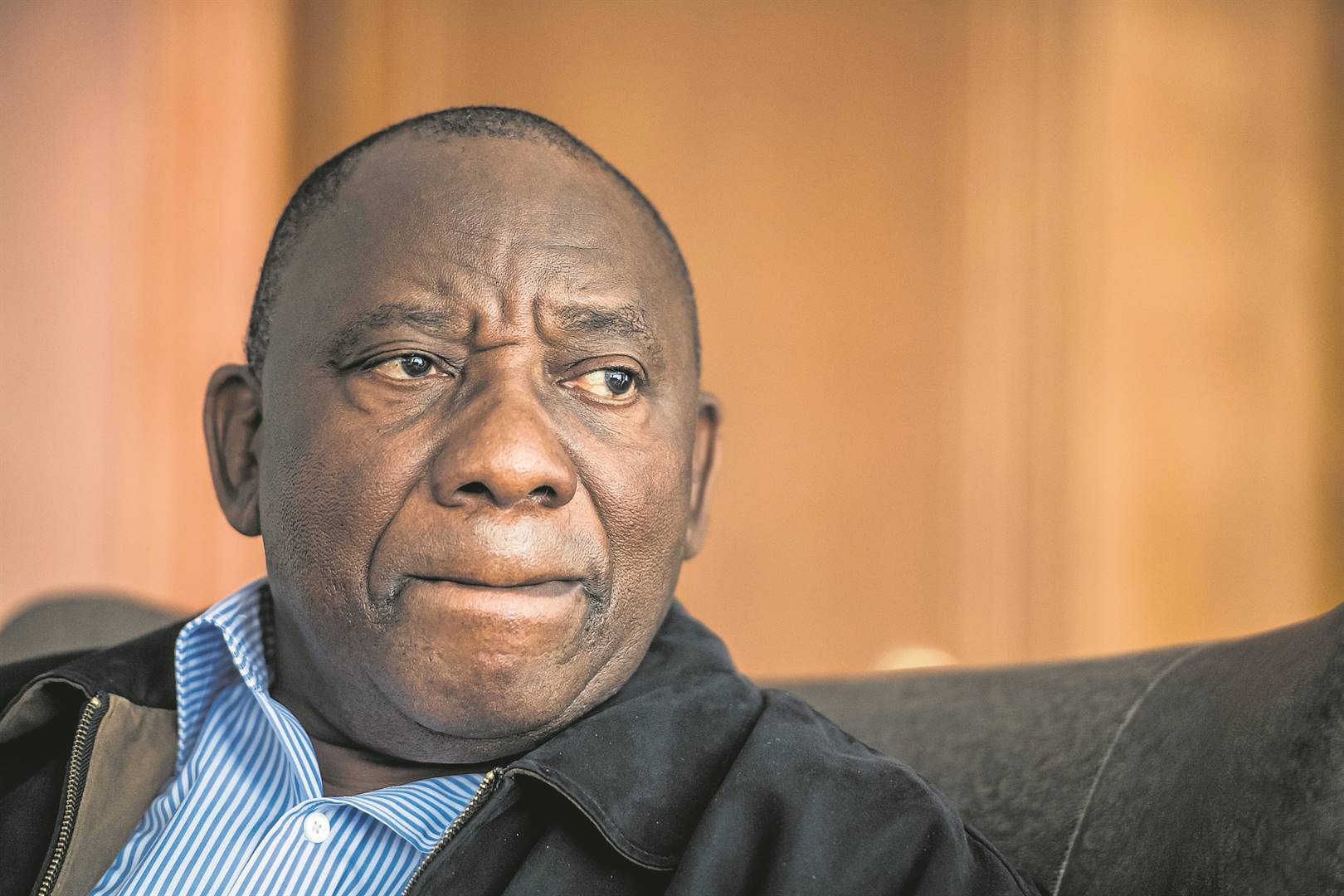
As unions slam the state’s intention to renege on their three-year remuneration deal, a showdown is set for this week that may force the president’s hand.
Labour federation Cosatu has urged President Cyril Ramaphosa to “lead the country and his Cabinet”, and not allow ministers to make far-reaching pronouncements on policy issues that do not fall within their ambit, and which cause rifts in society.
Speaking to City Press on the eve of two major meetings between Ramaphosa’s administration and the country’s major trade unions, Cosatu president Zingiswa Losi said it was time for the president to take leadership and rein in Finance Minister Tito Mboweni, who announced plans to slash the public sector wage bill by R160.2 billion over three years.
Mboweni’s plan, which will entail the cash-strapped government reneging on a three-year deal reached at the National Bargaining Council, has been described by Cosatu as “a declaration of war” and has been rejected by other trade union federations.
Cosatu and the SA Communist Party (SACP) are set to attend the ANC’s national working committee (NWC) on Monday to iron out pressing issues.
Although the initial agenda had been about determining the direction of state-owned enterprises (SOEs), Mboweni’s new proposals are now also set to be put on the table.
On the same day, Treasury is expected to cross swords with unions at the monthly meeting of the presidential working committee on jobs at the National Economic Development and Labour Council (Nedlac), the consensus-seeking body comprising government, business, labour and civil society.
The Nedlac meeting was meant to focus on rescuing struggling SOEs, primarily Eskom and SAA.
According to Losi, at last month’s Nedlac meeting a small team was selected, tasked “to enrich the proposal to rescue Eskom”.
They “would be expected to give feedback on progress made”, while the NWC was “meant to have a robust discussion on SAA – in particular, on the cutting of routes”.
Despite this, she said, Cosatu was going to take the opportunity to engage with government and express the union’s outrage at the announcement made by Mboweni in Wednesday’s budget speech.
PRESIDENT’S TOUGH CHOICE
A fuming Losi said Mboweni “held no such competence” to make the pronouncement, yet he had made it “without consultation” and “in bad faith”.
“What we said, and will again reiterate to Ramaphosa, is that we do not appreciate many voices emanating from his Cabinet ministers. You hear this one say: ‘Sell SAA, we don’t need it’ after a resolution to the contrary has been taken by the ruling party’s national executive committee. Then there is a position by the ANC that says: ‘Do not sell SAA.’
“And you have a minister [Mboweni] who crosses to a different portfolio [the ministry of public service and administration] and speaks about that portfolio, instead of dealing with the issues that are within his portfolio.”
Losi called on Ramaphosa to take leadership to stop what she called “the willy-nilly pronouncements”.
“So, we are saying: ‘Let the president lead the country and his Cabinet.’ He was, of course, elected to do so,” said Losi.
This has left Ramaphosa between a rock and a hard place: either he supports the finance minister he tasked with rescuing the country’s finances or the trade union federation – which, together with the SACP, has been his most solid ally in the fractured ANC.
Mboweni’s big announcement came just two days after Ramaphosa attended Cosatu’s central executive committee meeting and sweet-talked the union and its affiliate members.
According to those who attended, Ramaphosa commended the proposal by Cosatu to allow government to tap into the Government Employees’ Pension Fund, the Unemployment Insurance Fund and unclaimed money in the mine workers’ retirement fund.
He told the meeting that this was good as it meant that “the workers’ money will be circulating among themselves, rather than [having] the money being used in other projects that do not empower the workers themselves”.
“So,” said one of the attendees, “workers are going to benefit from their money, which is not like benefiting other people, like when the Public Investment Corporation bailed out private companies.
“He also emphasised that he was paying a visit to acknowledge Cosatu’s role and support.”
City Press understands that Ramaphosa pandered to the union without giving a hint of the pending announcement by his finance minister.
After Mboweni’s announcement, Cosatu leaders – who had been championing the intervention and selling it to recalcitrant affiliates – were left embarrassed.
Some affiliates accused the federation of bending over backwards for government and the ANC, without any reciprocation from the leading alliance partner.
WHY NOT THE OTHERS?
Ratings agency Moody’s Investors Service has already warned that the economic forecasts contained in Mboweni’s 2020 budget could be rendered uncertain by the labour movement’s reaction and expected engagements with the governing party, which could lead to Ramaphosa’s back-tracking on the proposed public wage bill reductions.
Cosatu’s deputy president, Mike Shingange, said the trade union was not being “alarmist”.
“This country was established through institutions of social dialogue, Nedlac being one of them and the bargaining council being the other – meaning, the minister was supposed to make pronouncements after a resolution was reached, following a collective agreement by Nedlac social partners and government. But he jumped the gun,” he said.
Shingange said the union would query the timing of the “supposed engagement” that Treasury claims to have afforded the unions.
“We asked for details of what government meant when it said that the public service was bloated. In the same breath, we asked government to stop being disingenuous by only basing its argument on provincial and national department wage bills.
“We requested that since the government was talking about a bloated public sector wage bill, it ought to also include statistics on SOE workers as well as local government workers.
“Instead of a response, the government sent us its public sector wage bill documents the night before the minister’s speech,” said Shingange.
The main difference of opinion between Cosatu and the government, and a deal-breaker for Cosatu, is Treasury’s focus only on workers falling under the public services bargaining council [teachers, nurses and the police], not those who fall under local government and SOEs.
“Public service is not just the departments of health, education and home affairs, especially when we are talking about them in fiscal terms. Public service is all those entities that derive their salaries and remuneration from the same government purse.
“Mboweni must talk about SOEs. He must talk about the SA National Roads Agency, the Passenger Rail Agency of SA, the SA Social Security Agency, Eskom and municipalities – all those who are getting their salaries from the same purse, as they, too, constitute public services,” said Shingange.
While Cosatu maintains that Mboweni was not within his rights to make the announcement, City Press has seen a document, titled Management of the Public Service Wage Bill, which was presented by Treasury and the department of public service and administration on Tuesday to the unions and the Public Service Coordinating Bargaining Council (PSCBC).
Treasury and the public service department were making their case as to why there was a need to trim the public sector wage bill.
THERE IS NO MONEY
According to the presentation, government spending is at “its highest level since the start of democracy” and is “well above what the economy could afford” – meaning, government will not be able to afford the wage increases, in terms of the wage bill agreement reached in 2018.
According to that agreement, salaries are set to increase by 7% – or by the consumer price index, plus 1% – on April 1, depending on workers’ job gradings.
However, Treasury and the department of public service and administration are proposing a review of the agreement, citing fiscal strain as a result of having had to make up the difference between spending and revenue over the past two years through borrowing.
Treasury explained that it had, through the bargaining process, tried to reduce this strain on the fiscus by reducing performance bonuses and offering early retirement packages.
However, since these had not yielded the desired results, a more aggressive intervention was now needed.
Wages have continued to skyrocket, with an employee at grade one level – the lowest-earning employee in the public sector – earning on average R130 379 annually, pointing to a compound annual growth rate of 9.4% since 2006/07.
The document presented to the PSCBC on February 25 makes it clear that, should government continue to honour the existing agreement, it “will be borrowing in excess of R375 billion, or 6.8% of gross domestic product, to maintain current spending levels”.
The wage bill currently constitutes 35.6% of government expenditure.
TALK TO US
What do you make of this standoff? Do you think labour’s demands are unreasonable? How do you feel about the government’s massive wage bill in this time of fiscal crisis?
SMS us on 35697 using the keyword WAGE and tell us what you think. Please include your name and province. SMSes cost R1.50. By participating, you agree to receive occasional marketing material
 | ||||||||||||||||||||||||||
Get in touchCity Press | ||||||||||||||||||||||||||
| ||||||||||||||||||||||||||
| Rise above the clutter | Choose your news | City Press in your inbox | ||||||||||||||||||||||||||
| City Press is an agenda-setting South African news brand that publishes across platforms. Its flagship print edition is distributed on a Sunday. |




 Publications
Publications
 Partners
Partners








